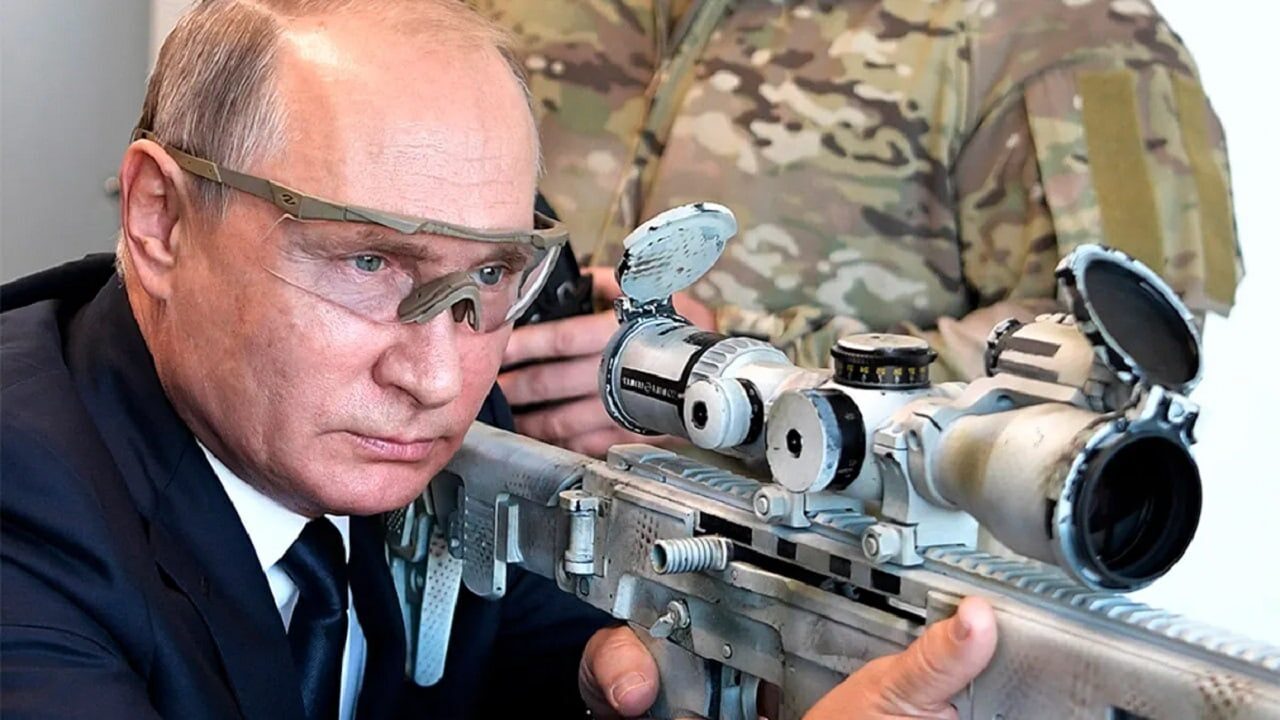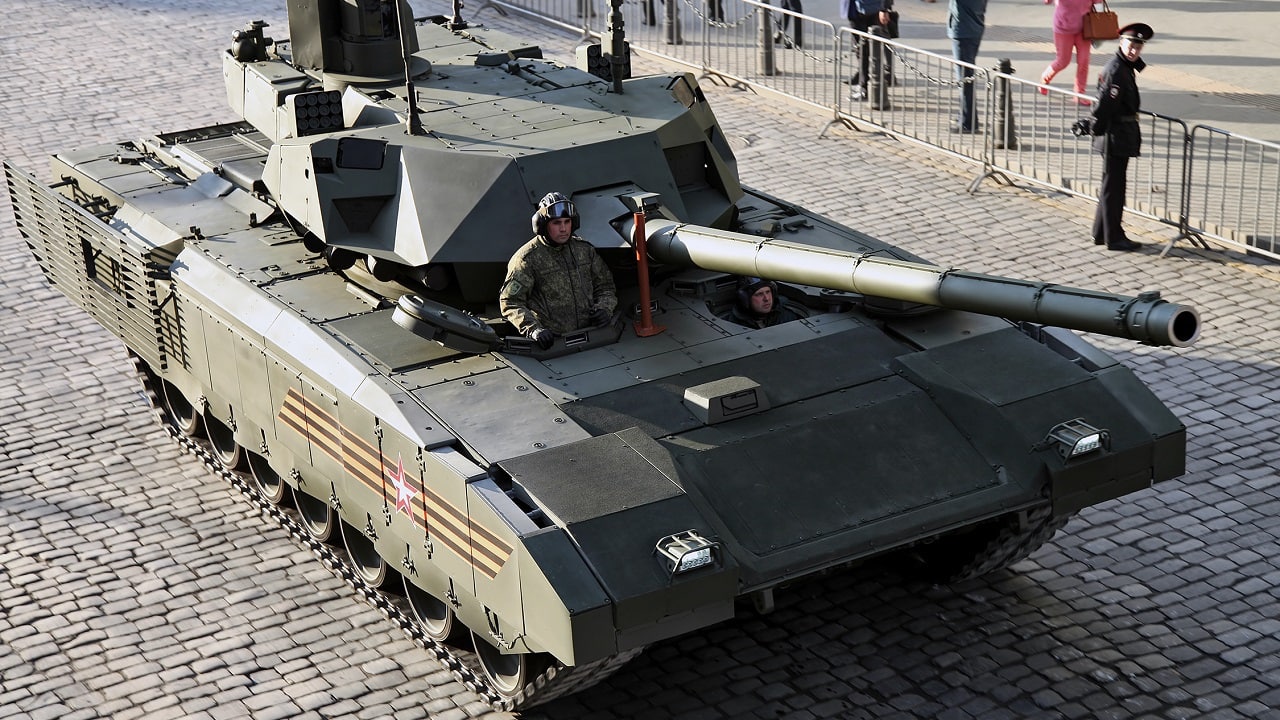Put simply, Russia’s genocidal war against Ukraine cannot and will not end as long as the Kremlin’s self-elected president, Vladimir Putin, remains in power. Talk to, threaten, or cajole the Russians as much as you want, but peace will be no nearer until Putin goes—whether physically or politically.

Russian President Putin testing a new sniper rifle. Image Credit: Russian State Media.
There are four reasons for such a dim view of Russia’s supreme leader.
For starters, nothing he says can be believed. Putin is so wholly wrapped in a mantle of mendacity that it is impossible to determine whether or not any of his pronouncements are truthful. President Ronald Reagan enjoined Americans to “trust, but verify” the Soviets. That’s pointless with Putin. He can’t be trusted, and he’s sure to blame whatever Russian transgression the West claims to have verified on the West.
But we do know that Putin is determined to reestablish the Russian empire and destroy Ukraine. After all, despite his mendacious assertions to the contrary, he’s already pursuing both goals. Some Western scholars and analysts still believe that the remote possibility of Ukraine ever joining NATO compelled poor Putin to respond with war and genocide. In fact, reimperialization was on the Kremlin’s agenda since the fall of the Soviet empire.
Boris Yeltsin confined his efforts to war with Chechnya, occupation of Transnistria, promotion of the Commonwealth of Independent States, and utilization of the Russian minorities living in the non-Russian states as Trojan horses. Putin upped the ante immediately after coming to power, committing genocide in the second Chechen war, invading Georgia in 2008, occupying Crimea and the Donbas in 2014, and launching an all-out war against Ukraine in 2022. The pattern is clear, and the genocidal anti-Ukrainian rhetoric—by Putin, his comrades, and his propagandists, in a word, by his entire regime—is equally clear.
The third reason for Putin’s unwillingness to engage in serious negotiations concerns his complete self-identification with the war. Russia’s supreme leader understands full well that his physical and political survival is a function of the war. Having started it, Putin owns it. If it goes well, he looks strong. If it goes badly, he looks weak—and the history of Russia is replete with instructive examples of the unfortunate things that happen to weak leaders.
Putin cannot afford to negotiate anything short of Ukraine’s capitulation, because anything else would elicit questions, among elites and masses, about the cost and wisdom of destroying the economy, losing a million soldiers, and isolating Mother Russia from her favorite watering holes in the West for the sake of a sliver of uninhabitable Ukrainian territory.
Finally, there’s Putin’s own self-perception. As his just-completed visit to North Korea vividly demonstrated, Putin is becoming Kim Jung Un, and Russia is well on the way to becoming North Korea. One can only imagine how Russian professionals must be squirming at the thought that the Riviera will be off-bounds and that the Hermit Kingdom will soon be their only available playground.
But no matter: like Kim, Putin doesn’t care about the preferences of the people he claims to champion. Like Kim, he wants his people to be arranged neatly in military fashion, arms synchronically raised, flags waving, broad smiles on their happy faces—all signs of their great love for their supreme leader. Putin must have been thrilled to see giant portraits of himself and Kim on the way to and in Pyongyang.
The Comprehensive Strategic Partnership Agreement signed by both great men, which “provides for the provision of mutual assistance in the event of aggression against one of the parties to this agreement,” is thus of importance for two reasons.
It heralds North Korea’s formal involvement in Russia’s genocidal war against Ukraine and raises the possibility that, were Kim to stage a provocation against South Korea and claim that it attacked first, Russia might have to get involved in the fighting. Putin surely loves the first part; he should be less enthusiastic about the second part, though given his penchant for strategic blunders, that may not be the case.
The agreement also symbolizes Russia’s transformation into North Korea and Putin’s transformation into Kim. And, just as Kim is congenitally incapable of negotiating in good faith with South Korea, so too Putin is congenitally incapable of negotiating in good faith with Ukraine.
For peace to be thinkable, Putin has to go. Ironically, the more Russia comes to resemble North Korea and the more Putin becomes Kim, the greater the likelihood—though not, alas, certainty—of opposition to this twofold metamorphosis.
Public opinion surveys show that most Russians appear to be happy with current conditions in Russia. That bodes ill for the country. But Russian elites have tasted the forbidden fruit of the West and know that North Korea is no option for them or their children, who are unlikely to be thrilled by the prospect of studying at North Korea’s universities. That bodes ill for Putin and his Kim-esque aspirations.
The only questions are: When will Russian elites do something about Russia’s creeping Northkoreanization? When will they decide that Putin’s survival is incompatible with theirs? Who will be the next Yevgeny Prigozhin, Vladimir Lenin, or Fanny Kaplan?
Meanwhile, Ukraine and the West should continue reminding Russians on the battlefield that the costs of becoming North Korea are extremely, and unnecessarily, high.
About the Author: Dr. Alexander Motyl
Dr. Alexander Motyl is a professor of political science at Rutgers-Newark. A specialist on Ukraine, Russia, and the USSR, and on nationalism, revolutions, empires, and theory, he is the author of 10 books of nonfiction, including Pidsumky imperii (2009); Puti imperii (2004); Imperial Ends: The Decay, Collapse, and Revival of Empires (2001); Revolutions, Nations, Empires: Conceptual Limits and Theoretical Possibilities (1999); Dilemmas of Independence: Ukraine after Totalitarianism (1993); and The Turn to the Right: The Ideological Origins and Development of Ukrainian Nationalism, 1919–1929 (1980); the editor of 15 volumes, including The Encyclopedia of Nationalism (2000) and The Holodomor Reader (2012); and a contributor of dozens of articles to academic and policy journals, newspaper op-ed pages, and magazines. He also has a weekly blog, “Ukraine’s Orange Blues.”

